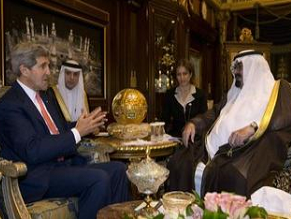|
World Jewish News

US Secretary of State John Kerry meets with Saudi King Abdullah Photo: REUTERS
|
Senior Saudi diplomat slams Iran nuclear deal, says Kingdom may be forced to act alone
18.12.2013, Israel and the World A high-ranking Saudi diplomat criticized the West's nuclear deal with Iran, saying that Saudi Arabia may be forced to act alone to maintain stability in the Middle East in an opinion article published in The New York Times on Wednesday.
Mohammed bin Nawaf bin Abdulaziz al Saud, the Saudi ambassador to Britain, expressed his frustration at the West's lack of interference in Syria and the United States' new deal with Iran.
He wrote that Saudi Arabia has enormous responsibilities in the region and the world, both economically and politically, and they cannot stand by as Western countries cooperate with Iran and hesitate to use force in Syria.
"We will act to fulfill these responsibilities, with or without the support of our Western partners," he wrote, adding that "the West has allowed one regime to survive and the other to continue its program for uranium enrichment, with all the consequent dangers of weaponization."
Bin Nawaf cited the atrocities in Syria, which have claimed over 100,000 civilian deaths, and reiterated Saudi Arabia's support for the Free Syrian Army.
Saudi Arabia also opposes Iran on countless fronts across the region, including their involvement with Syria, where they fund and arm rebels fighting against Iran’s friend, President Bashar Assad.
"The foreign policy choices being made in some Western capitals risk the stability of the region and, potentially, the security of the whole Arab world," bin Nawaf wrote. "This means the Kingdom of Saudi Arabia has no choice but to become more assertive in international affairs: more determined than ever to stand up for the genuine stability our region so desperately needs."
Saudi Arabia turned down a coveted UN Security Council seat in October to protest the failure of the international community to end the war in Syria. It was the first country elected to the position to turn it down.
Saudi Arabia has traditionally avoided big political statements, preferring to wield its influence as world's top oil exporter, birthplace of Islam and chief Arab ally of the United States behind closed doors.
The Security Council has been paralyzed over the Syria conflict, with permanent members Russia and China repeatedly blocking measures to condemn Syrian President Bashar Assad, a longtime ally of Riyadh's regional arch-rival Iran.
By JPOST.COM STAFF. Ariel Ben Solomon, Reuters contributed to this article.
JPost.com
|
|
